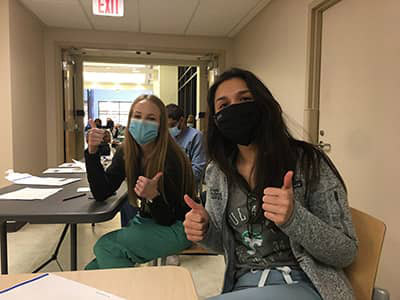 Dissection of the human body has been a mainstay of medical education for generations of students. The awe inspired by the gift of the donor, the amazement triggered by the intricacy of the muscles, bones, nerves, and blood vessels, and the exhaustion derived from the hours of study make this course one that physicians never forget. The Class of 2026 is currently experiencing this traditional—and necessary—rite of passage in their medical education. In addition to anatomy, they are also correlating structure with function by integrating physiology, biochemistry, histology, genetics, and embryology into their studies. In fact, their exams test integrated knowledge of organ systems, such as the musculoskeletal and circulatory “modules,” rather than individual course material. The students must learn everything simultaneously: how a system develops and functions, as well as how it appears microscopically and during laboratory dissection.
Dissection of the human body has been a mainstay of medical education for generations of students. The awe inspired by the gift of the donor, the amazement triggered by the intricacy of the muscles, bones, nerves, and blood vessels, and the exhaustion derived from the hours of study make this course one that physicians never forget. The Class of 2026 is currently experiencing this traditional—and necessary—rite of passage in their medical education. In addition to anatomy, they are also correlating structure with function by integrating physiology, biochemistry, histology, genetics, and embryology into their studies. In fact, their exams test integrated knowledge of organ systems, such as the musculoskeletal and circulatory “modules,” rather than individual course material. The students must learn everything simultaneously: how a system develops and functions, as well as how it appears microscopically and during laboratory dissection.
As one might imagine, this is an intense period of study, and you may not be hearing from your student as often due to the long hours spent in the lab or in other preparation. The week of an exam is particularly stressful, as students make their final preparations for their module exam. You might consider sending your student an e-card, gift box, or other special remembrance during the week leading to the exams. They likely will not have time to talk, text, or email but they would certainly get a lift from special support at these times. Please click the link below to see the list of module exam dates for the T1 students:
For overview of entire medical school schedule: https://medicine.tulane.edu/education/undergraduate-medical-education/curriculum
